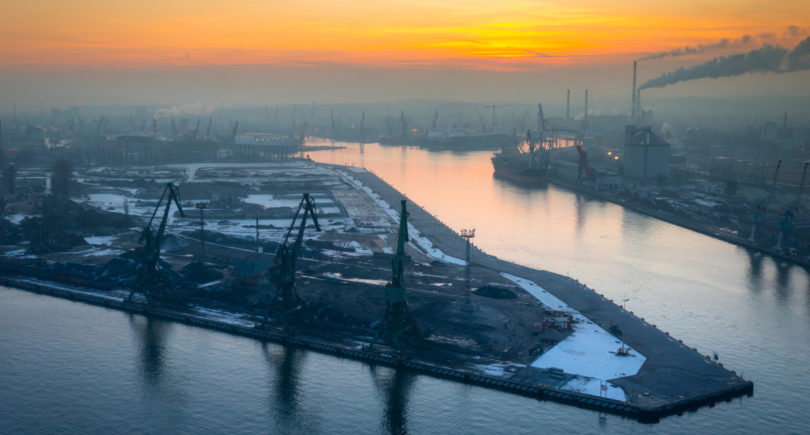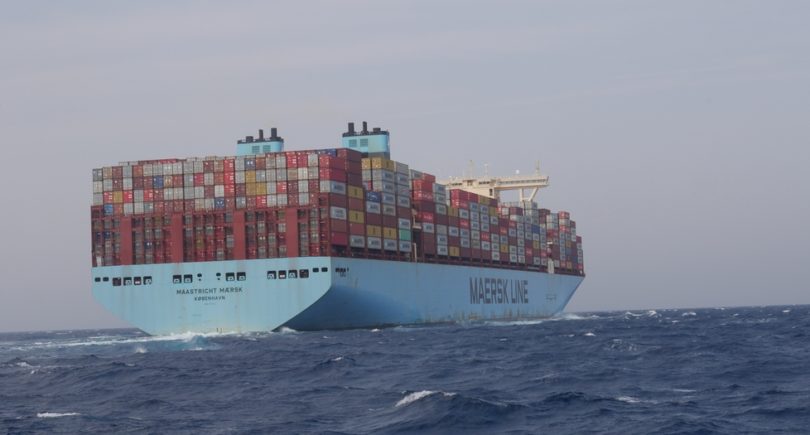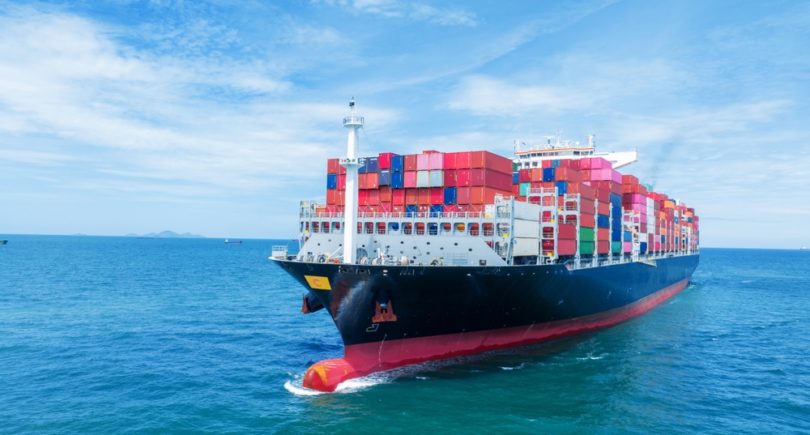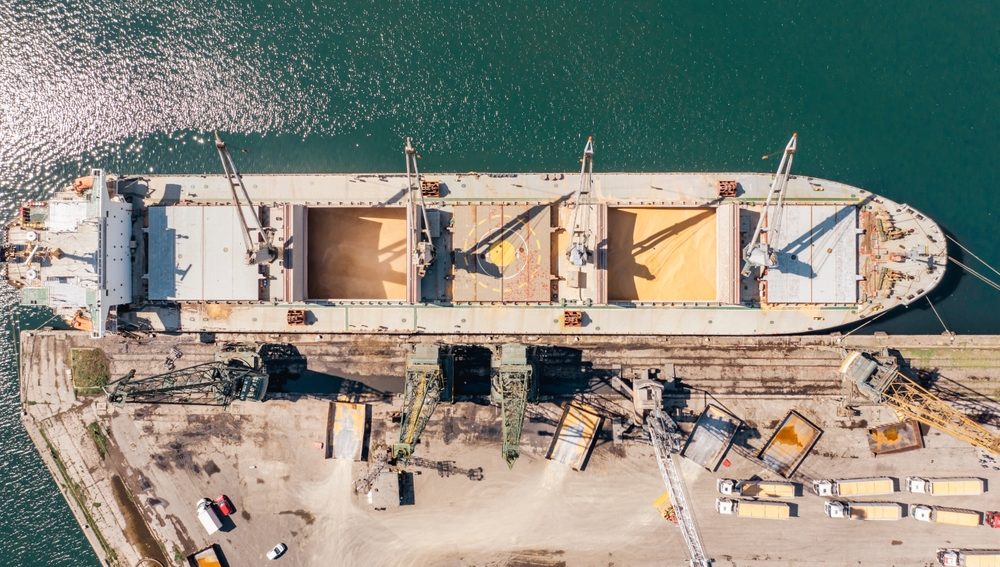
Posts Infrastructure sea ports 3218 25 September 2023
Ukraine has opened a temporary corridor for ships to its ports, but no one gives guarantees of its stability and security
The armed aggression of the Russian Federation against Ukraine and the blockade of sea ports stopped Ukrainian maritime exports and led to the fact that many foreign ships were frozen near the berths. As of February 24, 2022, 100 commercial vessels (with the exception of the port fleet) were blocked in the Ukrainian ports of the Black and Azov Seas. 34 of them belonged to companies from EU countries (21 of them belonged to Greece), 24 vessels belonged to Turkish shipowners. Most of the ships arrived for loading at Ukrainian ports literally one or two days before the start of hostilities.
Then the grain deal for a year (which ceased to be valid in July) made it possible to free the berths of Ukrainian ports from ships, and warehouses from accumulated grain cargo, while other types of mass exports – ferrous metals and iron ore – had to be exported on a much smaller scale through other logistics routes. Representatives of the Ukrainian iron and steel industry from the very beginning of the grain deal insisted on its extension to steel products and iron ore, but for many reasons this did not happen.
Ship’s evacuation
On August 10, the Ukrainian Navy announced temporary routes for civilian ships to/from Black Sea ports. The corridor was primarily intended for the evacuation of ships located in Ukrainian ports.
According to Andriy Klimenko, Head of the Monitoring Group of the Institute of Black Sea Strategic Studies on the situation in Crimea and the Black Sea region, at the beginning of the war, 41 ships were blocked in the ports of Greater Odesa, most of which left during the operation of the grain corridor with specified grain cargoes.
The last remaining blocked ships over the past month went along a temporary corridor, which was intended to evacuate ships from the ports of Chornomorsk, Odesa and Pivdenny, which were there before the start of the full-scale Russian invasion.
The list of ships that have currently left Ukrainian seaports looks like this:
- The container ship Joseph Schulte left the port of Odesa on August 16. The ship carried on board more than 30 thousand tons of cargo in 2114 containers, including food.
- The bulk carrier Primus with a cargo of rolled steel left the waters of the Odessa port on August 26.
- The bulk carrier Anna Theresa left the port of Pivdenny on September 1 with a cargo of 56 thousand tons of pig iron.
- The bulk carrier Ocean Courtesy left Pivdenny on September 1 with 172 thousand tons of iron ore concentrate on board.
- The bulk carrier Puma, loaded with 16 thousand tons of steel and 14 thousand tons of rapeseed, left Odesa on September 15.
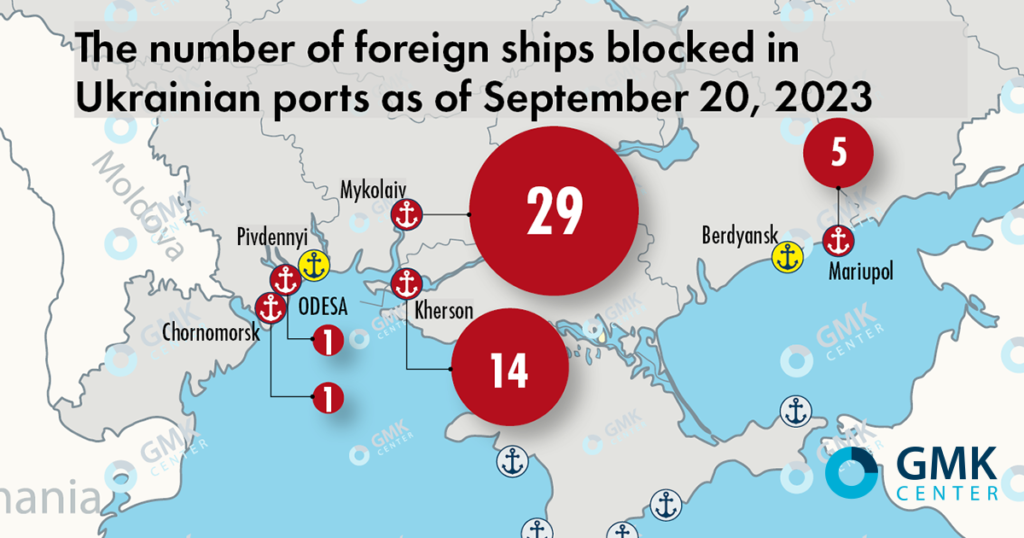
As of now, the following ports remain blocked:
- Mykolaiv – 29 vessels;
- Kherson – 14 vessels;
- Odesa – 1 vessel (bulk carrier Comet; owner – German company);
- Chornomorsk – 1 vessel (bulk carrier Emmakris III, owner – a company from the UAE, but the vessel was arrested by the Ukrainian authorities, since it has a de facto Russian owner);
- Mariupol – 5 (was 6).
“The occupiers released the Turkish bulk carrier Azov Concord from the port of Mariupol on June 22, 2022. This ship belongs to the famous Turkish company Albros Shipping & Trading. The departure of this ship (the only Turkish ship blocked in Mariupol) was made in accordance with the agreement of the presidents of Turkiye and the Russian Federation,” explains Andriy Klimenko.
There are no blocked ships left in Berdyansk and Pivdenny. All blocked ships left Pivdenny with cargo when such an opportunity arose, and from Berdyansk – at the request of the aggressors.
“On March 15, 2022, by order of the Russian invaders, all ships blocked in the port of Berdyansk left the occupied port. This was necessary to free up berths for ships of the Russian Black Sea Fleet, because the Russian Federation decided to use the port as a logistics center to supply a military group on the Ukrainian coast of the Sea of Azov,” adds Andriy Klimenko.
Iron and steel cargoes
If grain cargoes on previously blocked ships left the ports legally – as part of the grain deal, then to unblock the cargoes of iron and steel companies, it took complex efforts of the Office of the President, the Ministry of Infrastructure, the Ukrainian Navy and other law enforcement agencies.
In August-September, the Primus, Anna Theresa, Ocean Courtesy and Puma vessels, blocked there since February 24, 2022, already left the ports of Odesa and Pivdenny with iron and steel cargoes.
«On released ships’ board (Primus, Anna Theresa, Ocean Courtesy) there were products of Ukrainian steelmakers and miners, produced even before the start of a full-scale war. Namely, this is more than 76 thousand tons of rolled steel produced by the Azovstal, Zaporizhstal, Kametstal and ArcelorMittal Kryvyi Rih plants, as well as 172 thousand tons of iron ore concentrate produced at the Metinvest group processing plant,» Metinvest notes.
According to Olexandr Vodoviz, head of the project office of Metinvest group’s CEO, breaking the naval blockade with ships carrying Ukrainian steel is the first step towards completely unblocking sea exports for the entire range of Ukrainian products: fertilizers, steel, iron ore, food, pipes, etc.
“And, therefore, to the accelerated recovery of the Ukrainian economy, which suffered colossal losses, in particular due to the illegal blockade of Ukrainian ports by Russia. Complete unblocking of ports for all types of cargo will not only return Ukraine to the status of a maritime state, but will also bring the Ukrainian economy additional tens of billions of dollars in foreign exchange earnings per year, the state budget – hundreds of billions of UAH in additional tax revenue, and hundreds of thousands of Ukrainians – jobs and stable incomes to the family budget», adds Olexander Vodoviz.
Export prospects
A breakthrough for Ukrainian exports came when in September the first ships used the temporary corridor towards the ports of Greater Odesa. Thus, on September 16, Turkish bulk carriers Aroyat and Resilient Africa entered the port of Chornomorsk, which arrived with 21 thousand tons of wheat. Both vessels have already successfully left the port with a cargo of 3 thousand tons and 17.6 thousand tons of wheat, respectively.
“The prospects for ships leaving through the temporary corridor are quite positive. Over the past month, several ships have departed from the ports of Odesa, Chornomorsk and Pivdenny thanks to the announced routes for the movement of civilian ships. Also, a few days ago, the ships arrived at the port of Chornomorsk, and one of them has already successfully left the port with a grain cargo and is heading to the Bosphorus,” notes law firm Interlegal.
It should be noted that vessels with a fairly low carrying capacity, and not large-tonnage bulk carriers, first decided to enter Chornomorsk. Not all foreign shipowners risk sending their ships to a combat zone. However, already in the “second wave” there are more capacious ships. Currently, three new vessels (bulk carriers Azara, Ying Hao 01, Eneida) are moving to Ukrainian ports to load 127 thousand tons of agricultural products and iron ore.
At present, the resumption of the grain deal looks impossible due to the position of the parties. Russia demands that Rosselkhozbank be connected to SWIFT, and not its subsidiary bank. The Russian Federation also demands that insurance be renewed for Russian ships transporting agricultural products and that they be allowed to enter foreign ports. However, the West refuses to lift these bans.
In such conditions, it is clear that a temporary corridor may be the solution that will allow the resumption of Ukrainian exports through ports, including iron and steel cargo.
On the other hand, market participants are cautiously optimistic about the possibilities of using the temporary corridor.
“We do not see any serious obstacles to the ships exiting and this opens up opportunities that did not exist before and should be taken advantage of. However, it is important to remember the military threat and mine danger from Russia, which remains relevant,” Interlegal clarifies.
However, at the moment, no one can give guarantees of stability and, most importantly, security of the corridor. Thus, the Ministry of Infrastructure and cargo owners, for security reasons, refrain from commenting on the prospects for the operation of the temporary corridor. In addition, there are problems with cargo insurance. In particular, the British maritime insurer Lloyd’s does not insure grain transportation from Ukrainian ports via a new corridor without international support.


